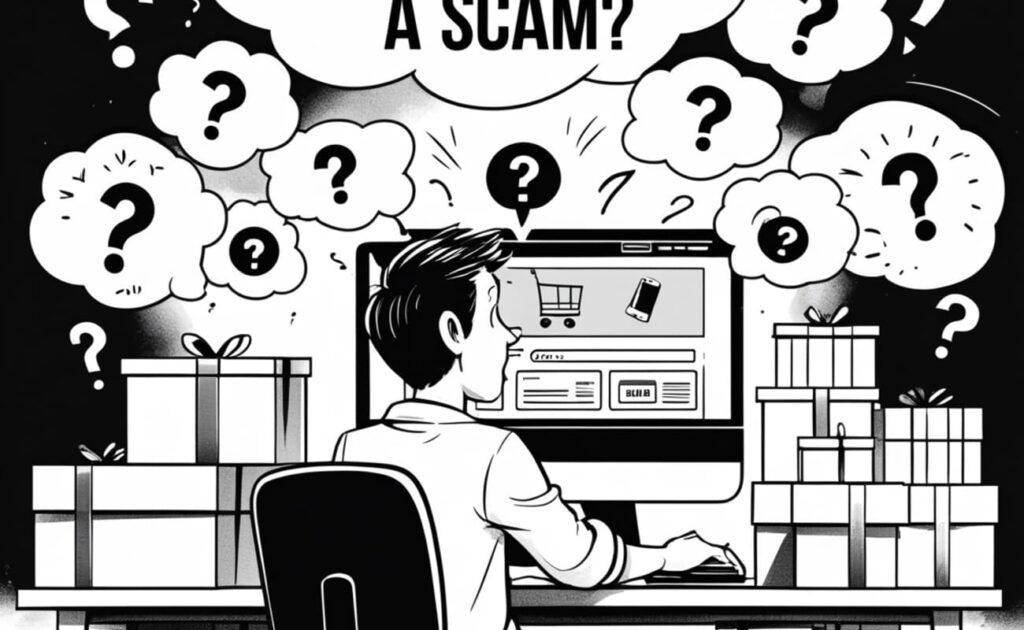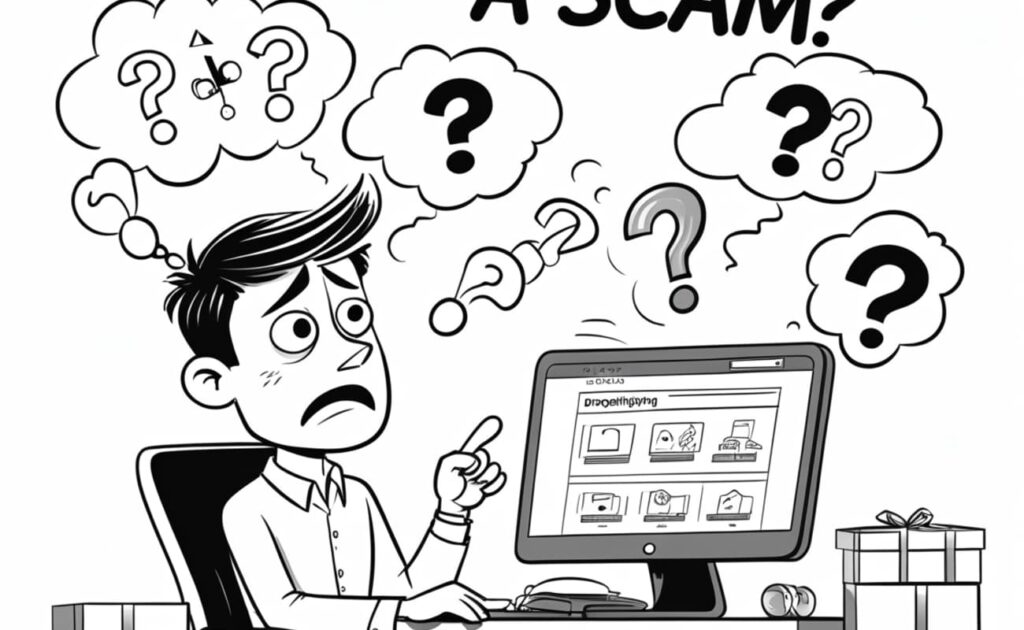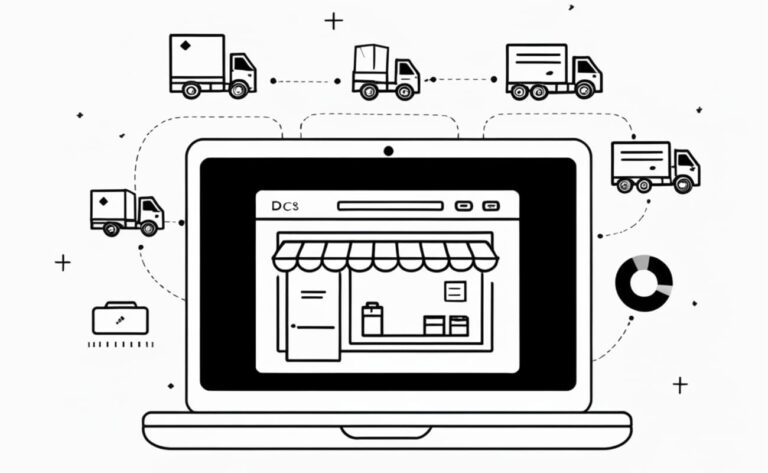Before we dive into the details of this comprehensive guide, feel free to check out our related article on dropshipping salary to learn how many individuals are successfully earning a living from dropshipping. Additionally, for an external perspective on this business model, you might want to explore insights on the Shopify Dropshipping Blog. Now let’s address one of the most frequently asked questions: is dropshipping a scam?
The Legitimacy and Appeal of Dropshipping
Dropshipping emerged as a promising e-commerce model that eliminates the need for a physical inventory or warehouse storage. In this business approach, the seller lists products online and only purchases them from a supplier after a customer has placed an order. This method offers a cost-effective alternative to traditional retailing, reducing overhead expenses and simplifying operations. So, is dropshipping a scam? Absolutely not. Dropshipping, when executed with proper research and ethical practices, is a legitimate and legal business model.
Many entrepreneurs appreciate dropshipping because it offers an accessible gateway into the world of online sales. The absence of upfront inventory expenses allows newcomers to experiment without significant financial risk. Furthermore, dropshipping platforms have evolved, and many reputable suppliers now adhere to strict quality standards. However, the question is dropshipping a scam largely depends on how it’s managed. The reputation and success of dropshipping ventures are often intertwined with the trustworthiness of the suppliers and the transparency of their practices.
At its core, the dropshipping method capitalizes on the digital marketplace. Legally, there is nothing wrong with operating this way. In fact, many established businesses deploy dropshipping as a core component of their supply chain strategy. Does that mean you should ignore the potential pitfalls? Not at all. When you ask, is dropshipping a scam, it’s crucial to learn how to identify when a dropshipping operation crosses the line from legitimate entrepreneurship to a deceptive scam.
Understanding the Hidden Pitfalls and Fraud Concerns
The question remains: is dropshipping a scam, or is it just another viable method of online retail? The answer is nuanced. Although the model is fundamentally legal, certain aspects can be exploited to deceive unsuspecting consumers and aspiring entrepreneurs. A common problem arises with suppliers who engage in unethical practices such as selling non-existent products or misrepresenting the quality of their merchandise. Some shady individuals even create the illusion of a fully stocked inventory using fake dropshipping screens, presenting an appealing façade that crumbles once you delve deeper. This is exactly when concerns about is dropshipping a scam become relevant.
One significant risk is the use of counterfeit or unreliable suppliers. When entrepreneurs are lured by attractive profit margins, they may not initially perform adequate due diligence. This oversight can lead to significant delays in shipment, incorrect or damaged products, or even complete non-delivery. Furthermore, hidden costs such as unexpected transportation fees or customs charges can turn an ostensibly cost-effective business into a financial nightmare. Since the model relies heavily on third-party suppliers, the final customer experience ultimately hinges on the supplier’s efficiency and reliability. These are the moments when people often wonder, is dropshipping a scam.
Real-world experiences have shown that many problems in dropshipping stem from a lack of transparency. When fees are hidden or miscommunicated, the entire business relationship becomes strained. Some entrepreneurs have lost substantial amounts by choosing suppliers who falsely advertise quality or who simply fail to deliver goods as promised. In other words, if you’re thinking, is dropshipping a scam, you might want to examine the practices behind your chosen suppliers and remain vigilant against deceit.
Additionally, many sellers may inadvertently become victims, leading consumers to associate all forms of dropshipping with fraudulent activity. This misperception is fueled by a few notorious rip-offs publicized online. The term scam becomes an umbrella label for any incident where consumer trust is breached. However, it is very important to recognize that the fraudulent cases arise not because the business model is illegal, but rather because some individuals misuse it for personal gain. So when asking, is dropshipping a scam, remember it’s about how the business is run, not the business model itself.

Comparing Pros and Cons: Dropshipping’s Business Model
| Advantages | Potential Risks |
|---|---|
|
Low Startup Costs: Entrepreneurs can reduce initial expenses by eliminating the need for inventory or warehousing. This opens opportunities for many who wish to test the waters of e-commerce. Flexibility: With no physical inventory to manage, businesses can adjust product lines quickly based on market trends and customer feedback. Scalability: Dropshipping allows for easy expansion as sales volume increases without the constraint of traditional stock limitations. |
Quality Control Issues: Without direct access to products, ensuring quality becomes challenging and may result in customer dissatisfaction. Hidden Costs: Shipping fees, customs charges, and other unexpected expenses can erode profit margins. Supplier Reliability: Working with disreputable or unreliable suppliers might lead to stock discrepancies and delays. |
Spotting Legitimate Versus Fraudulent Dropshipping Practices
If you’re wondering, “Is dropshipping a scam?”, one of the best ways to protect yourself is by thoroughly vetting your suppliers. Start by searching for reviews on reputable platforms like Trustpilot. Many legitimate dropshipping businesses offer guarantees such as refundable shipping policies or money-back guarantees that help build trust over time. Have you ever found yourself reading mixed customer reviews and feeling uncertain about your supplier’s reliability? This is a common scenario when asking, “Is dropshipping a scam?”, and the answer is to look for consistency across multiple platforms before making any financial commitment.
Another red flag to watch out for, especially if you’re asking “Is dropshipping a scam?”, is the use of fake dropshipping screen images on websites. These screens often display inventories or order confirmations generated by computer algorithms rather than actual transactions. As a consumer or entrepreneur concerned with “Is dropshipping a scam?”, it’s essential to engage directly with your supplier and request functional demonstrations of order processing and shipping. Don’t you feel more secure when you see real-time data rather than a staged presentation?
Moreover, the digital landscape is replete with platforms and automated systems such as “Dropship io.” If you find yourself questioning, “Is dropshipping a scam?” or specifically “Dropship io is real or fake?”, it is important to perform independent research before integrating any such services into your business operations. By cross-checking the claims made on these platforms with independent reviews and, if possible, reaching out to existing users, you will be better equipped to separate fact from fiction. Relying solely on a flashy interface or promising testimonials can lead one astray, especially when the question “Is dropshipping a scam?” is on your mind. Always ask yourself: does this solution have a proven track record?
Many experienced entrepreneurs now advocate for sampling products physically before committing to large-scale orders to avoid falling into traps associated with “Is dropshipping a scam?” concerns. This practice not only verifies the quality but also provides insights into the supplier’s responsiveness. As dropshipping continues to evolve, ensuring transparency in all stages of the transaction is vital for long-term success. Employing methods like direct communication, sampling, and independent reviews are essential strategies that help in maintaining business integrity and answering once and for all, “Is dropshipping a scam?”
Legal Perspectives and Regulatory Oversight in Dropshipping
Diving deeper into the question, “Is dropshipping a scam?” many also wonder, “Is dropshipping legal?” The practice falls within standard legal frameworks. However, like many online business methods, dropshipping can attract legal scrutiny if deceptive practices are involved. Regulatory bodies have started to focus on scenarios where the misrepresentation of products or hidden additional fees misleads consumers, which often raises the question, “Is dropshipping a scam?” Therefore, while the base model is entirely legal, it is the responsibility of sellers to abide by consumer protection laws and advertising standards.
For those just starting out, especially if you are worried about “Is dropshipping a scam?”, it’s incredibly important to be upfront about all associated costs. Transparency builds trust and reduces the risk of legal ramifications later on. Entrepreneurs should also be aware that regulatory changes can occur, making it essential to stay updated with local and international e-commerce laws. In many countries, regulatory agencies require online businesses to provide clear disclosures about product specifications, sourcing, delivery timelines, and any additional charges—key points to consider when asking, “Is dropshipping a scam?” Have you double-checked if your business complies with these exact guidelines?
Many seasoned dropshippers emphasize the benefits of a comprehensive contract with suppliers, outlining responsibilities and quality standards. This can greatly help anyone questioning “Is dropshipping a scam?” A robust agreement helps in preempting potential disputes and ensures that both parties are aligned on expectations. If you have personal experience or a colleague who has navigated these contractual waters successfully, share that insight with your peers—transparency and shared knowledge can be incredibly empowering in avoiding scams and answering once and for all, “Is dropshipping a scam?”

Steps to Protect Yourself and Build a Trustworthy Dropshipping Business
Let’s address one of the most pressing concerns: How do you protect yourself from falling into fraudulent schemes while exploring the world of dropshipping? There are several key strategies that can help ensure you’re dealing with reputable suppliers:
Firstly, perform comprehensive background checks on any potential partner. Explore online reviews and testimonials from multiple sources. It is advisable to verify their business credentials and any certifications that could attest to their reliability. Asking direct questions such as “What is your return policy?” or “How do you handle unexpected shipping fees?” can set a transparent tone right from the beginning.
Secondly, consider leveraging technology. Many platforms provide tracking systems that allow you to monitor the progress of your orders in real time. These systems can often alert you to any delays or issues, thereby reducing the overall risk. Personally, I have found that utilizing a third-party escrow service for significant transactions can be a lifesaver, especially when dealing with new suppliers.
Thirdly, some entrepreneurs choose to invest a small amount of capital into sampling. This means ordering a few units before fully committing to a supplier. Such preliminary testing gives you a clear picture of what you’re dealing with without putting too much at risk. When I first ventured into the world of dropshipping, I remember the anxiety of waiting for my sample order to arrive; however, that small investment paid off by providing invaluable firsthand insight.
Finally, legal recourse should always be an option at your fingertips. Keep detailed records of all business communications and transactions. These records can be critical in the event of a dispute. Additionally, consider aligning with industry groups or forums where experiences can be shared openly, acting as an early warning system for any potential red flags.
Conclusion: The Fine Line Between Legitimacy and Scam
In conclusion, the simple answer to the question “is dropshipping a scam?” is: it depends on how it is executed. Dropshipping, as a business model, is legally sound and can be an incredibly effective strategy to minimize overhead and maximize flexibility. However, the pitfalls lie in the hands of those who choose unethical practices. Misrepresentation, hidden costs, and reliance on counterfeit supplier data contribute to the negative reputation that some dropshipping ventures have earned over time.
Like many industries, the legitimacy of dropshipping hinges on transparency and accountability. As you embark on your dropshipping journey, ask yourself: are you ready to invest time and resources into verifying suppliers, understanding all associated costs, and ensuring exceptional customer service? If the answer is yes, then dropshipping can be a profitable and legitimate venture. But remember, vigilance is key. Only through careful research, continuous monitoring of supplier performance, and a commitment to ethical practices can you truly separate the wheat from the chaff.
Ultimately, this analytical exploration should empower you to make informed decisions in the marketplace. Whether you are a budding entrepreneur or a seasoned e-commerce veteran, maintaining clarity and honesty in your business model is crucial. Embrace the advantages of dropshipping, but never lose sight of the potential pitfalls, and always be proactive in protecting both your investment and your customers’ trust.
Frequently Asked Questions (FAQ)
Is dropshipping legal?
Yes, dropshipping is a legal business model. However, its legitimacy depends on adherence to consumer protection laws and transparent business practices. It is crucial for dropshippers to clearly disclose any additional costs and to deliver on promised product quality and shipping timelines.
What is bad about dropshipping?
While dropshipping offers significant advantages such as low startup costs and flexibility, its challenges include dealing with unreliable suppliers, hidden fees such as unforeseen shipping or customs charges, and difficulties in maintaining quality control since the seller does not physically handle the products.
What constitutes a fake dropshipping screen?
A fake dropshipping screen typically refers to a falsified demonstration of inventory or order processing that misleads buyers about the availability or legitimacy of products. These screens are often automated displays that do not reflect actual transactions, and they can be a sign of a deceptive operation.
Is Dropship io real or fake?
The legitimacy of platforms like “Dropship io” can vary widely. It is essential to perform in-depth independent research, read reviews from credible sources, and if possible, test the platform on a smaller scale before fully integrating it into your business model. Trustworthy platforms will have verifiable user testimonials and clear, consistent performance metrics.
How can I build trust with my dropshipping suppliers?
Establishing and maintaining trust involves thorough background checks, clear communication about policies and fees, sampling products before committing fully, and consistently monitoring feedback on reputable review sites. Additionally, securing written contracts and agreements can help set clear expectations and serve as legal protection in the event of disputes.









